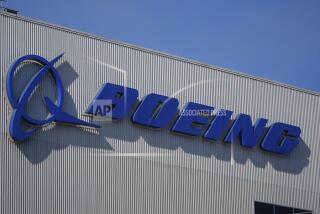Boeing Casting Off Parts Units in Bid to Build Profits
- Share via
SEATTLE — In its effort to boost profit and cash flow Boeing Co. will likely jettison less lucrative parts shops as it embraces more specialized airplane assembly operations, Chief Executive Phil Condit told Reuters on Sunday.
While the aerospace giant has been seeking assets to unload or consolidate since 1998, its streamlining process has zeroed in on nonessential parts fabrication of late, with plans to sell off plants and consolidate parts work.
“We tend to be moving away from detailed parts fabrication. Our skills are integration and assembly as opposed to making clips and brackets and small parts,” Condit said in an interview at Boeing’s Seattle headquarters.
In June, Boeing announced plans to sell off a vastly underutilized plant in St. Louis employing 1,700 people making components for its military jet factory there.
Last week, the company said it would cut 900 jobs over two years at its Huntington Beach facility, shifting Delta rocket work now done there to other plants in Pueblo, Colo., and Decatur, Ala.
After buying McDonnell Douglas for $16.3 billion in 1997, Boeing posted its first full-year loss in 50 years and has since struggled to rebuild its profits even as commercial airplane deliveries hit a record 620 in 1999.
Analysts say part of Boeing’s current inefficiencies can be traced to overlapping work by McDonnell Douglas units that Boeing has not yet fully rationalized. The McDonnell units include its Long Beach plant where the C-17 transport military aircraft is built.
Lately, Boeing has demonstrated a vigorous commitment to “right-sizing” its sprawling empire, which posted revenue of $58 billion in 1999, but a relatively modest profit of $1.2 billion, as rival Airbus Industrie continued to gain in jetliner sales.
“We are looking aggressively at how much facilities we have, what are our assets, are we using them wisely, are we doing the right work in the right place and we’ll continue doing that. But you’ve got to do it very carefully,” Condit said.
Recent rumors have Boeing selling or shutting down its Auburn, Wash., fabrication headquarters, where it produces more than 12 million airplane parts per year. Condit called that rumor premature speculation.
“That’s well beyond where we are at this point. We’re trying to understand each piece of what we’re doing,” he said.
But Boeing workers have plenty to be nervous about, including a campaign to trim the overall payroll that has so far slashed about 50,000 jobs from a 1998 peak of 238,600. And 10,000 more could go by the end of this year.
Condit noted that the proposed $3.75-billion purchase of El Segundo-based Hughes Electronics Corp.’s satellite-building operations could put 9,000 more people on the payroll.
“By year end, we should have the Hughes deal closed. That adds,” Condit said, stressing that raising production of its 737 jet to 28 per month sometime in 2001 from 24 now would also add jobs.
Despite a disruptive 40-day strike by its 20,000-strong engineers’ union last winter, and a recent surge in defections among that group, Condit described overall labor relations as “very good.”
“If you compare us to high-tech, they tend to run at five times the turnover that we run,” Condit said.
The company, which employs 189,000 in two dozen states, is Southern California’s largest private employer.
Boeing stock rose 88 cents Friday to close at $41.81 on the New York Stock Exchange.
More to Read
Inside the business of entertainment
The Wide Shot brings you news, analysis and insights on everything from streaming wars to production — and what it all means for the future.
You may occasionally receive promotional content from the Los Angeles Times.










